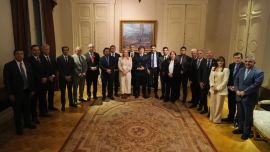If the biggest problem here last week was really the presidential inability to quote a Mexican quip correctly in either letter or spirit in his eternal bid to place himself on the right side of his conversation partner of the moment (Spanish premier Pedro Sánchez in this case), then Argentina is not doing so badly when looking around the rest of the region. The ineptly snide denigration of other Latin Americans came dangerously close to military dictator Juan Carlos Onganía’s proud boast over half a century ago that Argentines were “the [pre-Mandela] South Africans of this continent,” but events elsewhere are not conspiring to prove President Alberto Fernández wrong. Whether the mayhem of the Mexican midterms (with dozens of candidates shot dead during the campaign), Peru’s second electoral dead heat in a row as almost the least of its problems, Colombia’s violent unrest barely calmed by the recent pandemic upsurge or Chile and Uruguay being forced into similar restrictions to here despite vastly superior vaccination percentages, the comparisons seem to favour Argentina. So are there grounds for complacency?
In fact, problems abound beyond presidential gaffes or even the might-have-beens over Pfizer vaccine purchases, which tends to be the preferred opposition issue recently, but Peronist governments seem to be experts in asymptomatic crises, as the build-up to the 2015 elections already showed. This is not only a matter of skill but also of luck – the ongoing commodity price boom (likely to be sustained while the current dollar glut drives money in that direction) is providing enough extra cash not only to subsidise absurdly outdated utility billing but also to line up various electioneering goodies (including tax breaks coming from one of the most fiscally voracious governments ever, with the wealth tax a recent example). Impossible to say whether this will suffice against a groundswell of pandemic discontent come November but it contributes to maintaining a general context of unstable balance.
That concept of unstable balance is already paradoxical but a comparative glance around the region invites the greater paradox that if other countries doing things right are going wrong, could the reverse be true for Argentina? Pacific Rim countries like Chile, Colombia and Peru have banished the dysfunctional inflation crippling Argentina with stable currencies and opened up their trade to the world with export-led growth, joining global value chains, tapping capital markets and attracting overseas investment in sustained cycles lasting decades with consensus policies across the ideological spectrum – their reward was constant growth with the Chilean economy expanding sevenfold in the last three decades, Peru averaging close to five percent annually in the quarter-century and even the less spectacular growth of a Colombia emerging from guerrilla strife sufficing to halve poverty in the last decade (in the same period Peru advanced from over half the population below the poverty line to less than a quarter while Chilean poverty had fallen from 40 percent to single digits in the last three decades). Little or none of the above holds true for an increasingly poverty-stricken Argentina stuck in stagflation for over a decade now but while the wheels have come off all three of the above countries, Argentina’s course remains steady in a familiar rut.
The above comparison does not justify any superiority complex if based on this paradox of faring better by doing things worse yet nor is a certain self-congratulation wholly out of order. Despite the widely deplored grieta chasm, Argentina’s political climate is civilised with a transparent electoral process when compared to the bitterly contested vote in Peru (and earlier in Ecuador’s first round) or the slaughter of Mexican candidates. Peronist labour legislation has many critics while the social safety net installed following the 2001-2002 meltdown has contributed immensely towards unsustainable public spending, yet they have thus far kept at bay the explosive unrest of countries whose rapid growth has only deepened their inequalities.
Such is the big picture but in this pandemic most people are forced to concentrate on the day by day, making their own individual balance between the next round of restrictions and their economic or other urgencies.


















Comments